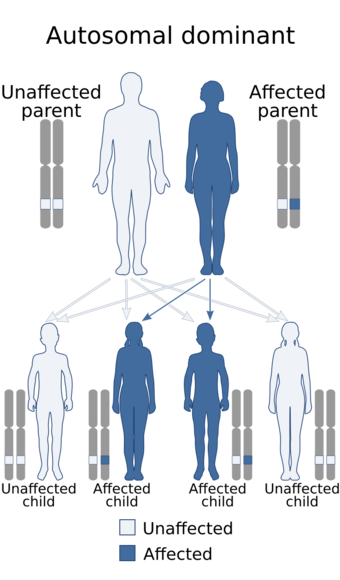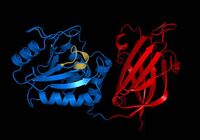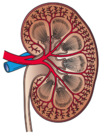Medicine:Bannayan–Riley–Ruvalcaba syndrome
| Bannayan–Riley–Ruvalcaba syndrome | |
|---|---|
| Other names | BRRS |
 | |
| Autosomal dominant is the manner in which this condition is inherited | |
| Symptoms | Enlarged head[1] |
| Causes | Mutations in the PTEN gene [2] |
| Diagnostic method | Based on signs and symptoms[3] |
| Treatment | Based on symptoms[3] |
Bannayan–Riley–Ruvalcaba syndrome (BRRS) is a rare overgrowth syndrome and hamartomatous disorder with occurrence of multiple subcutaneous lipomas, macrocephaly and hemangiomas. The disease is inherited in an autosomal dominant manner.[4] The disease belongs to a family of hamartomatous polyposis syndromes, which also includes Peutz–Jeghers syndrome, juvenile polyposis and Cowden syndrome. Mutation of the PTEN gene underlies this syndrome, as well as Cowden syndrome, Proteus syndrome, and Proteus-like syndrome, these four syndromes are referred to as PTEN Hamartoma-Tumor Syndromes.[5]
Signs and symptoms
Bannayan–Riley–Ruvalcaba syndrome is associated with enlarged head and benign mesodermal hamartomas (multiple hemangiomas, and intestinal polyps). Dysmorphy as well as delayed neuropsychomotor development can also be present.[1][5] The head enlargement does not cause widening of the ventricles or raised intracranial pressure; these individuals have a higher risk of developing tumors, as the gene involved in BRRs is phosphatase and tensin homologue.
Some individuals have thyroid issues consistent with multinodular goiter, thyroid adenoma, differentiated non-medullary thyroid cancer, most lesions are slowly growing. Visceral as well as intracranial involvement may occur in some cases, and can cause bleeding and symptomatic mechanical compression[6][7]
Genetics
The genetics of the Bannayan–Riley–Ruvalcaba syndrome is determined, in the majority of cases, via the PTEN gene which presents about 30 mutations in this condition. This gene which regulates cell growth, when not working properly can lead to hamartomas. PTEN chromosomal location is 10q23.31, while the molecular location is 87,863,438 to 87,971,930 [2][7]
There are many syndromes that are linked to PTEN aside from Bannayan–Riley–Ruvalcaba Syndrome.[8]
The syndrome combines Bannayan–Zonana syndrome, Riley–Smith syndrome, and Ruvalcaba–Myhre–Smith syndrome.[9]
Bannayan–Zonana syndrome is named for George A. Bannayan and Jonathan Zonana[10]
Diagnosis
In terms of diagnosing Bannayan–Riley–Ruvalcaba syndrome there is no current method outside the physical characteristics that may be present as signs/symptoms.[3] There are, however, multiple molecular genetics tests (and cytogenetic test) to determine Bannayan–Riley–Ruvalcaba syndrome.[11]
Differential diagnosis
The differential diagnosis for BRRS consists of the following:[12]
Treatment
In terms of management one should observe what signs or symptoms are present and therefore treat those as there is no other current guideline. The affected individual should be monitored for cancer of:[3]
- Thyroid
- Breast
- Renal
See also
- List of cutaneous conditions
- List of cutaneous neoplasms associated with systemic syndromes
References
- ↑ 1.0 1.1 (in en) NORD guide to rare disorders. Philadelphia: Lippincott Williams & Wilkins. 2003. p. 240. ISBN 9780781730631. https://books.google.com/books?id=99YPDvFWBB0C&q=bannayan+riley+ruvalcaba+syndrome+sign+and+symptom&pg=PA240. Retrieved 9 December 2016.
- ↑ 2.0 2.1 "PTEN gene". https://ghr.nlm.nih.gov/gene/PTEN#.
- ↑ 3.0 3.1 3.2 3.3 "Bannayan-Riley-Ruvalcaba syndrome | Genetic and Rare Diseases Information Center(GARD) – an NCATS Program". https://rarediseases.info.nih.gov/diseases/5887/bannayan-riley-ruvalcaba-syndrome.
- ↑ "Bannayan-Riley-Ruvalcaba syndrome". https://ghr.nlm.nih.gov/condition/bannayan-riley-ruvalcaba-syndrome.
- ↑ 5.0 5.1 Eng, Charis (1 January 1993). "PTEN Hamartoma Tumor Syndrome". GeneReviews. PMID 20301661. https://www.ncbi.nlm.nih.gov/books/NBK1488/#phts.Clinical_Description. Retrieved 9 December 2016.update 2016
- ↑ Hobert, Judith A; Eng, Charis (6 August 2009). "PTEN hamartoma tumor syndrome: An overview". Genetics in Medicine 11 (10): 687–694. doi:10.1097/GIM.0b013e3181ac9aea. PMID 19668082.
- ↑ 7.0 7.1 "OMIM Entry - # 153480 - BANNAYAN-RILEY-RUVALCABA SYNDROME; BRRS". http://www.omim.org/entry/153480.
- ↑ Edmondson, Andrew C.; Kalish, Jennifer M. (9 December 2016). "Overgrowth Syndromes". Journal of Pediatric Genetics 4 (3): 136–143. doi:10.1055/s-0035-1564440. ISSN 2146-4596. PMID 27617124.
- ↑ Hannigan, Steve, ed (2007). Inherited Metabolic Diseases: A Guide to 100 Conditions. Radcliffe Publishing. p. 101. ISBN 978-1-84619-099-5. https://books.google.com/books?id=lQvUH3ALdJcC&q=Ruvalcaba-Myhre-Smith+syndrome&pg=PA101.
- ↑ Bannayan, G. A. (1 July 1971). "Lipomatosis, angiomatosis, and macrencephalia. A previously undescribed congenital syndrome". Archives of Pathology 92 (1): 1–5. ISSN 0363-0153. PMID 5091590.
- ↑ "Bannayan-Riley-Ruvalcaba syndrome - Conditions - GTR - NCBI". https://www.ncbi.nlm.nih.gov/gtr/conditions/C0265326/.
- ↑ RESERVED, INSERM US14 -- ALL RIGHTS. "Orphanet: Bannayan Riley Ruvalcaba syndrome". http://www.orpha.net/consor/cgi-bin/OC_Exp.php?Expert=109.
Further reading
- Gilbert-Barness, Enid; Kapur, Raj P.; Oligny, Luc Laurier; Siebert, Joseph R. (2007) (in en). Potter's Pathology of the Fetus and Infant: 2-Volume Set. Edinburgh: Elsevier Health Sciences. ISBN 9780323076166. https://books.google.com/books?id=ZwklCwAAQBAJ&q=Bannayan%E2%80%93Riley%E2%80%93Ruvalcaba+syndrome+diagnosis&pg=PT2265. Retrieved 9 December 2016.
- (eds.), Martino Ruggieri, Ignacio Pascual-Castroviejo, Concezio Di Rocco; Castroviejo, Ignacio Pascual; Rocco, Concezio Di (2008) (in en). Neurocutaneous disorders phakomatoses and hamartoneoplastic syndromes (revised. ed.). Wien: Springer. ISBN 9783211695005. https://books.google.com/books?id=otBj86IALsYC&q=Bannayan%E2%80%93Riley%E2%80%93Ruvalcaba+syndrome+treatment&pg=PA514. Retrieved 9 December 2016.
External links
| Classification |
|---|
 |



